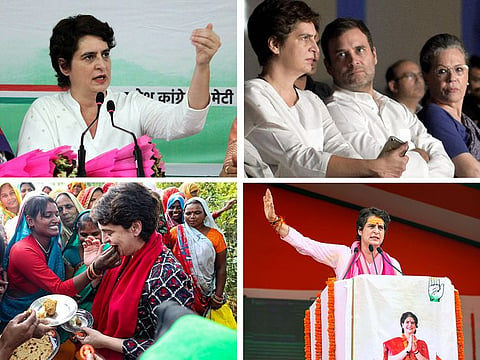Has Priyanka Gandhi reignited women’s reservation issue in India?
At least on gender issues, the Gandhis seem sincere in getting in more women in politics

Win or lose, Priyanka Gandhi Vadra — or PGV as she is universally known as — is trying to impact the all important Uttar Pradesh (UP) elections by making it all about herself.
Keenly aware that she is talking up a party which has no organisational structure on the ground and can’t really create it in less than four months in the lead up to the elections, Priyanka is aiming to lead from the front.
The fact is that Congress is considered a pariah in the state where the opposition is up against the electoral might of the ruling Bharatiya Janata Party (BJP).
With zero skin in the game, PGV’s announcement that the Congress would reserve 40 per cent of tickets for women in the UP has caught the other parties by surprise.
Realpolitik in India has ensured a total grip of patriarchy on all aspects of politics. Even in the Congress, Sonia Gandhi, interim president, Ambika Soni, her former aide, who is now in semi retirement and PGV are the only women representatives in the powerful Congress Working Committee (CWC).
Why only in UP?
While breathless television anchors ask if the 40 per cent reservation for women in UP by the Congress could be a game changer, the real question to be asked is why only UP?
If this is not a poll gimmick for a hungry hunt of headlines by PGV, why didn’t she and the Congress announce it for Punjab and Uttarakhand, which will vote with UP and where the Congress has a real chance to win — actual skin in the game.
Consider this: the women’s reservation bill has languished in Parliament for decades. Sonia Gandhi, as the powerful chairperson of the United Progressive Alliance (UPA), couldn’t make the bill a reality.
Mamata Banerjee, earlier in Parliament and now Chief Minister of West Bengal, and Mayawati, four term UP Chief Minister, couldn’t ensure the bill became a law.
Why? It is because entitled patriarchal men stonewalled the bridge across party lines. They united to keep women out — the incredible trope of a short haired harridan was used.
And, women in politics kept quiet. In India, women have to fit in to gendered specific roles to be in politics or in her role as wife, daughter, widow or the sanyasan (mendicant).
Playing gendered roles
The entry barriers into politics at the highest level are formidable and are all set by men who are comfortable with women from political families playing gendered roles.
They don’t quite know what to make of leaders such as the late Jayalalitha. If you want to make savvy political moves as a woman, you must have family as your calling card. Or fit in to the category of ideal “bahu” (daughter-in-law) complete with sari and sindoor (vermilion signifying the martial status).
It’s not as if a woman’s vote doesn’t exist in India. It does and women vote in large numbers for those who address their concerns. Nitish Kumar brought in prohibition in Bihar because women wanted it. He also pioneered a scheme to give school girls bicycles which got women voting for him in huge numbers.
But, this is women as voters trying to ensure policies they like and support. Women as politicians still face daunting hurdles.
In some states where there is reservation for women at the local level, women run as candidate and then their men take over to do the actual job while women still languish at home.
PGV as leader would know all of this. And, at least on gender issues, Gandhi and her sibling seem sincere in getting in more women in politics.
The biggest hurdle — men. To ensure 40 per cent women fight the elections and some win — would indeed be a game changer in the entrenched patriarchy, which is politics in India.
Sign up for the Daily Briefing
Get the latest news and updates straight to your inbox








